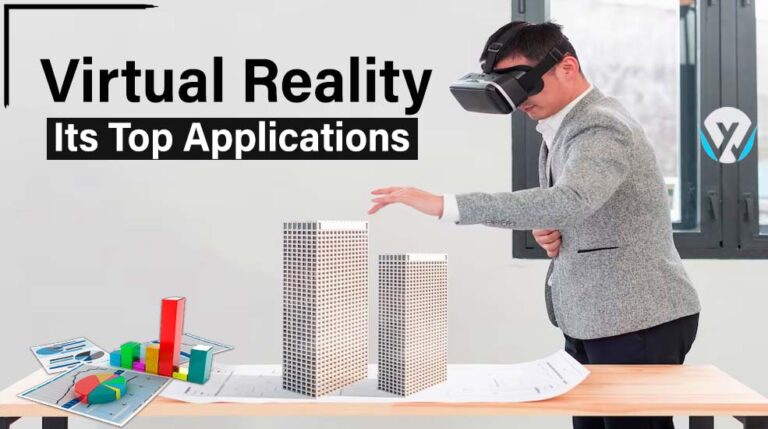One of the most inspiring technologies in this era is Virtual Reality. Virtual Reality (VR) works on 3D demonstration of the digital world. VR is based on a controlled environment for mirroring real-life scenarios. VR offers a 360-degree view and enables you to enjoy the digital world without risk. This technology has revolutionized every industry, including the healthcare sector, entertainment, automotive, education, space, and military. Virtual Reality also contributes to architecture, digital marketing, and tourism. In businesses, VR helps reduce costs, improves operations, increases ROI, and maximizes the user’s experience. The top applications of Virtual Reality are stated below:
Healthcare:
In the healthcare sector, VR technology enables trainers to develop thorough training programs for trainees. It offers an environment to learn and grow the capabilities in the digital world. VR allows specialists to practice complex surgeries in a digital environment before going to a real one. Virtual Reality is also used in cognitive behavior therapy for the treatment of patients with phobias and anxieties through a controlled environment.
Entertainment:
The entertainment industry was the very first to adopt virtual Reality. Virtual Reality has entirely changed conventional forms of entertainment. VR technology has a strong presence in the gaming industry, and people can play games in a digital environment with 360 views and real-life scenarios. VR technology offers an immense gaming experience.
Cinema and theme parks are also integrating with VR to stimulate view viewers’ explorers can digitally experience the movies with 3D technology.
Automotive industry:
Virtual technology empowers the automotive industry and replaces conventional ways of creating prototypes. VR enables manufacturers to develop and analyze prototypes in the digital world with 360 views.
Virtual Reality is implemented in the design and production of smart cars. VR also enables scientists and developers to learn driving patterns and create suspension systems through VR simulations.
Education:
Virtual technology is also contributing to the education industry. Virtual technology enables educational institutions to train their staff in the virtual world. VR is used for explaining complex experiments and situations to students. Virtual technology empowers the research students to conduct research work and develop prototypes in the 3D world.
VR technology increases the learning experience interestingly and engagingly. Universities and research institutions widely implement and use VR technology for research work.
Space and Virtual Reality:
Space has a different atmosphere and living environment than Earth. Astronauts have to get familiar with the environment and conditions of space. VR technology enables scientists to mirror these conditions in digital space. It allows astronauts to assess and observe the environment and conditions before going on a space mission.
VR technology was used to develop the stimulators to train the astronauts. VR technology allows the trainee minimal situational and environmental risk training sessions.
Military and Virtual Reality:
Advanced military solutions are widely adopted to integrate virtual technology in developing advanced equipment and research work. VR technology is also assumed to train the military for complex operations and situations in digital space before conducting real-time operations.
VR enables the trainees to face real-time scenarios with minimal risk. Virtual Reality allows trainee fighter pilots to get training in AR-operated stimulators before going for actual flights.
Architecture industry:
Artificial intelligence enables architects to build complex projects and designs in the digital world. It empowers them to develop and alter the designs swiftly. Virtual Reality is based on a digital interface with 360 views, enabling architects to experience the designs digitally before starting construction. Conversely, virtual technology allows customers to experience the architectural masterpiece in the digital world.
Digital marketing:
Virtual Reality enables businesses to offer customers 3D models of a close-up of products. Virtual Reality is more engaging and exciting as compared to conventional gadgets. This explores the new ways of digital marketing. VR technology allows businesses and marketing agencies to use VR on launch events to explain the products and features in digital space. VR technology is increasing the impact of digital marketing and ultimately leads to higher conversion rates.
Occupational safety:
Occupational safety is the primary concern in today’s world to safeguard workers and engineers. Workplace dangers and risks are addressed through VR, a simulated environment. It enables the safety staff to train workers in stimulators with minimal risks compared to actual scenarios. This training enhances safety awareness and protocols.
Tourism:
VR technology is exploring new ways and experiences in every field of life. VR also revolutionized the tourism industry. Before visiting, tourists can virtually experience the destinations, i.e., hotels, rooms, and tourist sites. It enables them to have real-time experience and make rational decisions. VR technology also allows hotels and tour operators to serve customers futuristically. Aggregately, VR is a win-win situation for both.
Retail stores and outlets:
VR technology is also used to display products digitally in advanced retail stores and outlets. It enables the customers to experience the project and its detailed features digitally. It grabs customers’ attention and allows them to participate uniquely. The involvement of VR enhances the customer experience and increases the conversion rate.
Collaboration and global connectivity:
Virtual Reality increases the opportunity for collaboration and global connectivity interestingly and entertainingly. VR enables businesses and organizations to connect digitally in 3D dynamics. It enhances the interaction experience and leads to solid engagements during online meetings.
Conclusion
VR technology is evolving rapidly and disrupting every industry and field. As per stats, the global market of Virtual Reality will be $12 billion in 2022 and surpass the $22 billion milestone by 2025. These figures show that we are going through a VR revolution. Almost every industry integrates with VR technology to increase productivity and customer experience, from gaming to entertainment, research to tourism. Virtual Reality impacts businesses differently. Some companies are pioneering full-dive VR and offering complete immersion in the virtual world, while others are applying the basics of VR. In the current world, VR technology enhances the customer experience, transforms the customer’s training, and creates new business models. VR is reshaping our lives in the true sense.




